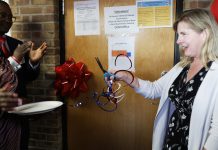
“‘My kids asked me to move to a little house with no steps. I am in my 90s. I moved to a place with no stairs. But when I visit my children, it became harder and harder to navigate the stairs to enter their homes,'” Ann Bussey read. The community advocate was reciting the story of a senior from her community to the Legislative Task Force on Aging during Wednesday’s meeting. Bussey continued, “‘I joined our fitness program and can now easily navigate the steps again. If you don’t do steps, you can’t do steps. I really liked my house a lot.'”
Bussey added that the fitness program that could’ve kept the senior in her home has faced closure four-times since 2010 and survives now due to sponsorship from the YMCA, not through intervention by local or state government.
The half-dozen elderly advocates at the task force meeting argued that government needs to play a larger role in helping seniors thrive. Currently, services for seniors are spread out amongst private and public groups, as well as local, state and federal departments and programs such as the American Association of Retired Persons (also known as AARP), Meals on Wheels, the Department of Human Services, and others.
“What we have in the state of Minnesota and in most counties is a siloed approach. This group is doing this, this group is doing this, this group is doing this,” Olmstead County Commissioner Gregory Wright said. “A siloed approach is doomed to fail.”
He and the other advocates said the time for the government to act is now.
“We have on record a number of plans that were written as far back as the 90s,” said Kathy Kelso, a public policy advisor for Elder Voice Advocates. “It is 2024. Nothing has been actualized.” “We can no longer afford to ignore this issue. Minnesota is facing a rapidly aging population, and our current systems are not equipped to handle this demographic shift,” said Kristine Sundberg, the Executive Director of Elder Voice Advocates/Disability Voice Advocates.
To face the problem, the presenters proposed a new state department – the Minnesota Department of Aging.
“The Minneapolis Regional Retirees Council urges this task force recognize the complexity of the challenges Minnesota faces as our population ages and rises to meet these challenges through creation of cabinet level department. A department capable of developing a strategy to change the existing culture about aging, plan to meet the challenges we face and capable of coordinating resources now scattered among a bewildering array of departments, and agencies,” testified Leif Grina, President of the Minneapolis Regional Retirees Council.
The proposal was met with discussion from task force members. One task member cautioned that creating a new department without new infrastructure to support it could lead to disappointment, while others called for studies on the state’s current efforts.
“I would like to have a cost analysis on every single thing that we’re spending money on in aging Minnesota,” said task force member Maureen Schneider, with the Minnesota Board on Aging. “What is this really costing us? And what are we getting for our money?”
Still, several task members supported the idea.
“Having a department will make the work more intentional and dedicated,” said Senator Alice Mann. “I also think that we can come up with some more flushed-out ideas of what we need that department to focus on instead of just saying, ‘This is what we need to do, you go ahead and do it,’ because we’ve seen those plans fail in the past as well.”
“I personally believe that yes, we do need a cabinet level entity to oversee aging services,” said Dr. Joseph Gaugler, Director, University of Minnesota’s Center for Healthy Aging and Innovation. “I think we just have to be clear-eyed as well, that if this is a recommendation coming from this task force, how can we ensure it is as successful as possible.”
About Margaret Stevens, Session Daily
Session Daily is published by the Minnesota House of Representatives' nonpartisan Public Information Services department.






